Discernment
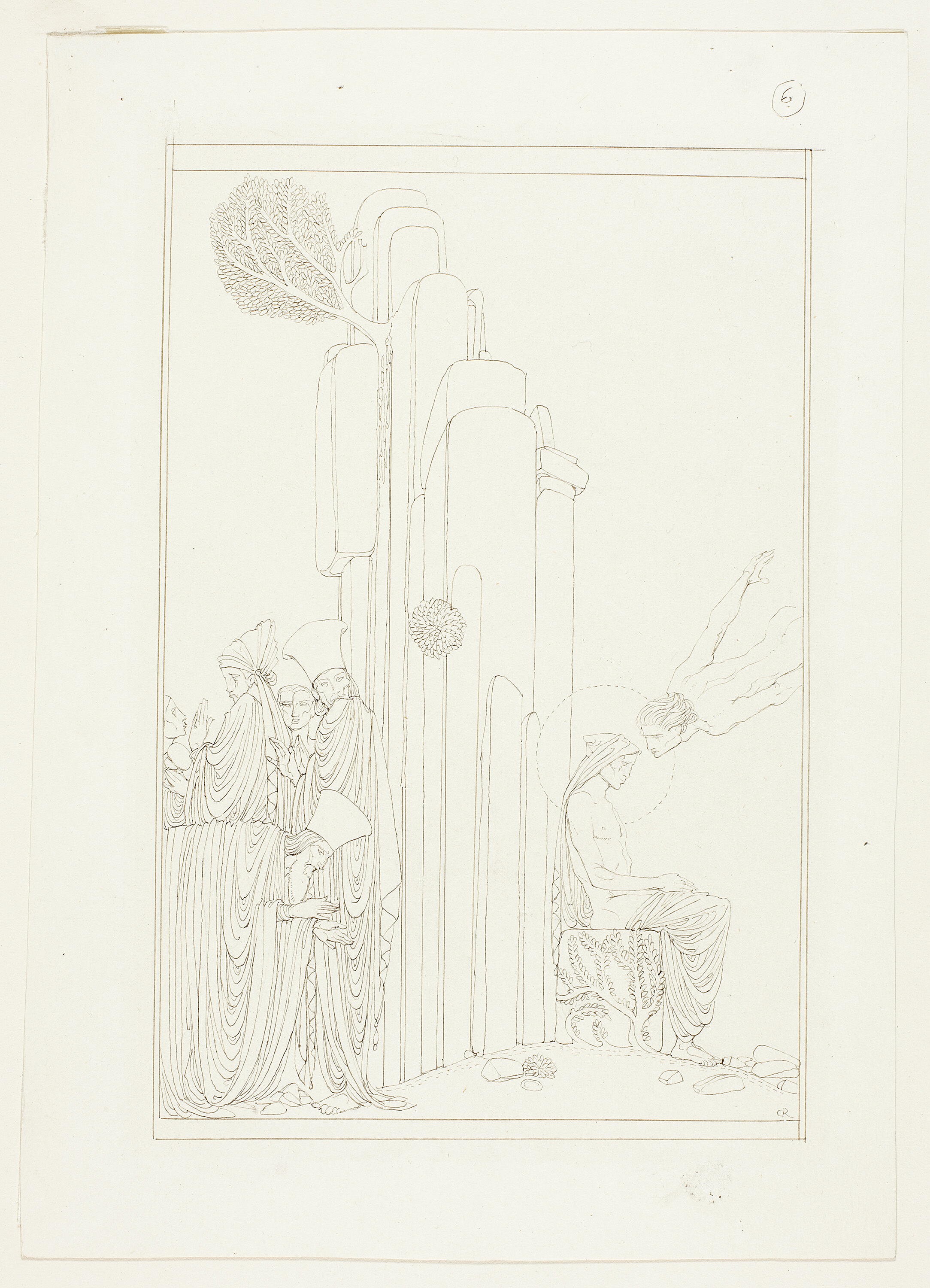
Charles Ricketts:
The Hermit; illustration for Oscar Wilde’s ‘
The Teacher of Wisdom’ (c. 1890–1924)
"Success and failure now come to me for definition."
Things look different after perspective's shifted. That innocuous statement doesn't quite cut the difference. Before, perspective amounted to a kind of blindness. However smug and self-important, my understanding was unavoidably misguided. It omitted the next insight and all the following ones. It amounted to the very best I could perceive then, but not all I would ever come to understand. I had no choice but to act upon what I could see and what I could comprehend. It would have been the same as screaming at sheep to expect me to perceive beyond what I could sense. The world I now inhabit made no sense a few short days ago. Now, my pasts should fade into ignorance.
Part of the Vanity Press relies upon a certain desperation on the part of its authors.
WritingSummary 06/29/2023
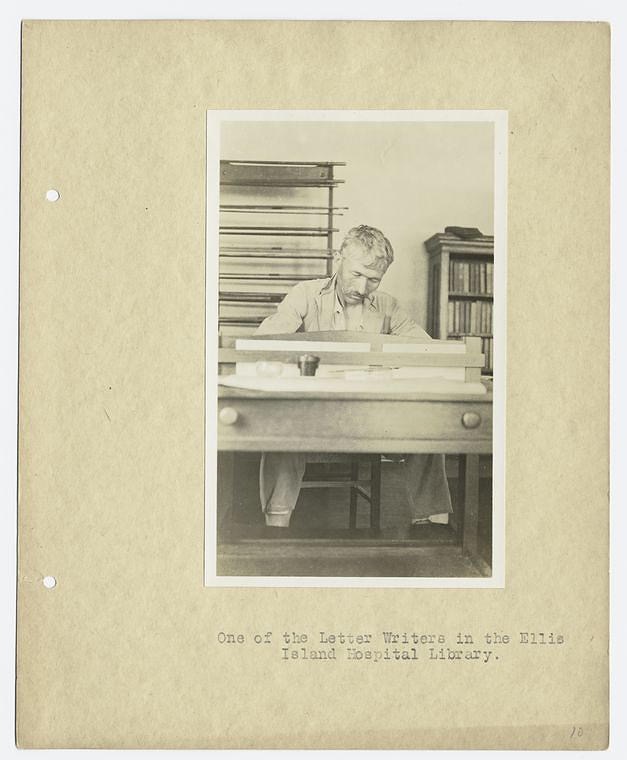
Percy Loom Sperr:
One of the letter writers in the
Ellis Island Hospital Library
(c. 1920s)
Considerably More Alive
I cannot over-emphasize the importance of this week's revelations. My Vanity story couldn't describe the depth of my discovery because I wrote it just as I noticed the shift starting. A few days later, I continue reeling, realizing I could become a proudly vain author. Vanity Publishing seems a pejorative term bestowed by its competition to demean it in the author's eyes. It delineates an elite by omission, a chosen few selected to represent a whole with a decided minority. It elevates the importance of gatekeepers and reputation as if follow-on success were necessarily the product of past performance when the future remains undecided until well after it’s past. I now feel embarrassed by my hesitation to fully engage with my gifts, however questionable, in favor of impatiently waiting for recognition that was always unlikely to arrive. I feel considerably more alive after this writing week. May this sensation continue and expand.
PerfectGame
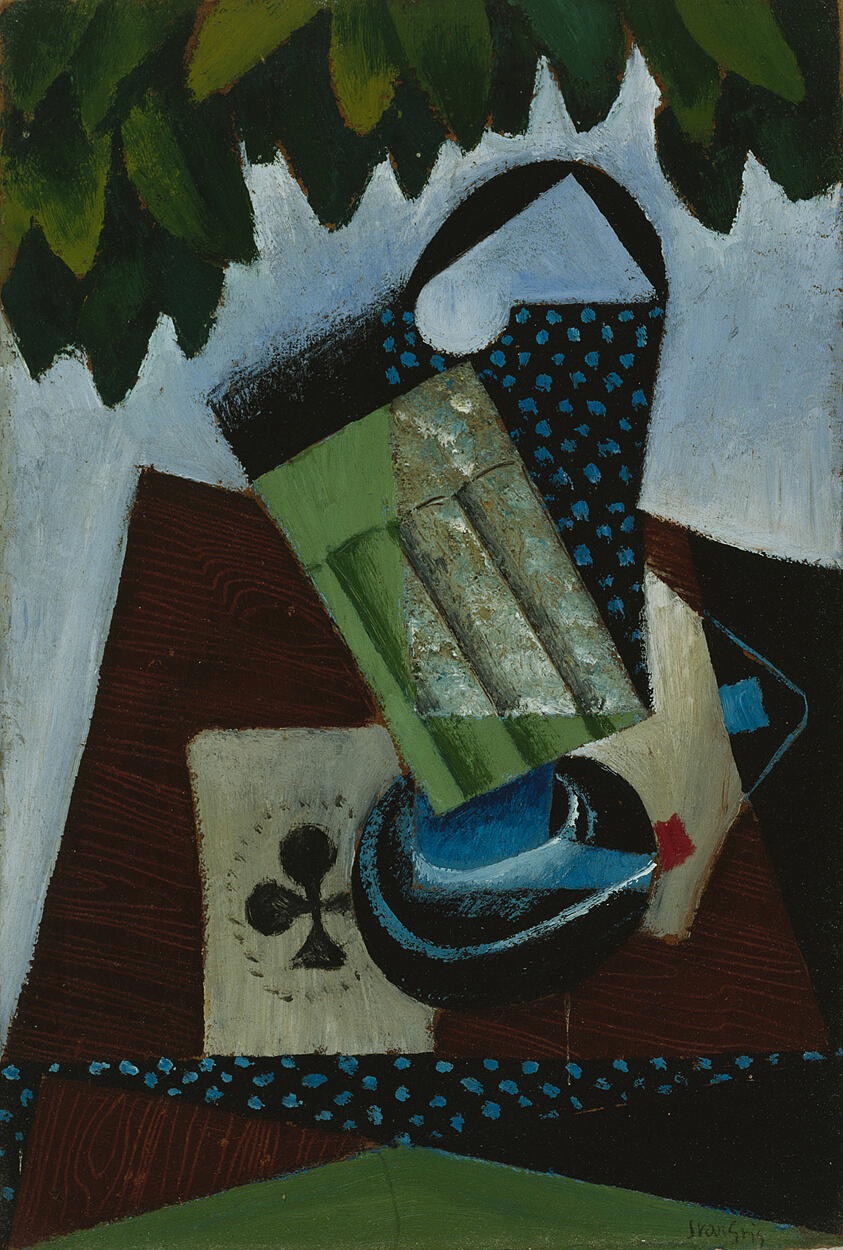
Juan Gris: Glass and Playing Cards (1915)
"Play ball, not perfection!"
"The 10 regular seasons in between (2013 through 2022) featured 22,765 imperfect games," wrote NYTimes sportswriter Tyler Kepner the morning after. A PerfectGame was pitched the evening before by Yankee's pitcher Domingo Germán, who fans booed off the mound his previous start. It had been eleven years since the last Major League Baseball PerfectGame. Only twenty-four have been accomplished in MLB's long history stretching back to the 1800s. The feat will not guarantee the pitcher Hall of Fame notoriety. If history's any predictor, he's much more likely to retire into obscurity. Perfection remains just what it used to be, without lasting honor, especially in its own land.
I Hone with the implicit notion that I am seeking more perfection.
Chronic

Duane Stephen Michals:
The Human Condition (1969)
"The Human Condition exclusively works in ways mysterious."
The Human Condition first seems acute and only later appears Chronic. There never was a cure for it, and though it at first seems passing—eminently overcomeable—it isn't. It never was. It seems more applicable to others than to you or me, but it belongs to everybody, though not necessarily equally. I acquire my aches and pains the same way as everybody. They visit, often without discernible reason, first acute, then, some of them becoming Chronic without rhyme or particular cause. The Chronic ones might settle in forever or seem to. My problem centers around my expectations. When I believe my pain's just visiting, I treat it as a guest. They might be my sensations, but I won't take them as seriously as if they were a permanent part of my extended family. Pain or Human Condition seems very much the same; we can reasonably anticipate them bedeviling us again and again and again.
My revelation yesterday transformed a long-standing acute condition into a Chronic one.
Vanity

Jan Saenredam after Abraham Bloemaert, published by Robert de Baudous:
Vanity, Vanity, All is Vanity (c. 1600)
"Vanity of vanities, saith the Preacher,
vanity of vanities; all is vanity.
What profit hath a man of all his labour
which he taketh under the sun?
One generation passeth away,
and another generation cometh:
but the earth abideth for ever."
Ecclesiastes 1:2-8 King James Version
I have for years danced against the idea that I might work with a "vanity" publisher. The vanity press represents that part of the publishing world where an author contracts with a service bureau to do all a standard publisher might do. These tasks include: registering a work and securing an ISBN—a unique registration number assigned to each edition of a published work, designing format and layout, cover design, production, and placement, among many other possible services, paid for up front by the author. The mythology of authorship insists it's humiliating to work with a vanity publisher because a real author should properly be discovered and pampered into print by a benevolent publisher who fronts the resources necessary to produce the work. In the myth, the publisher more than recoups their investment from the resulting widespread acceptance. Each new title is always destined to become a best-seller, and every author produces well above average sales.
In practice, many fewer than one percent of published works recoup their production cost.
Blindly
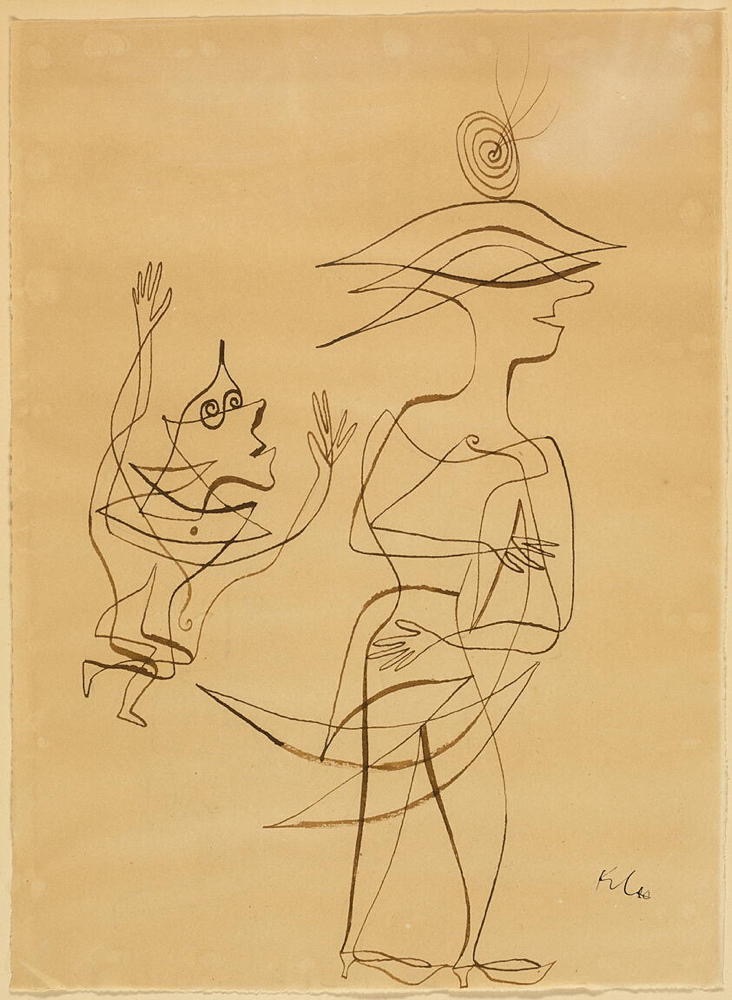
Paul Klee:
Follows with Concern, As Both are Blind (1927)
"… I'm unlikely to really understand how or why."
I might say that I resolved my hash mark issue, but that would, at best, be a partial truth. The issue was resolved, and yes, I was involved, but it would be a stretch to claim that the resolution was my fault. As I explained in earlier installments—ArrowingThrough and StrategicHesitation—I'd received hints and instructions from fellow users of my manuscripting app, though they didn't immediately resolve my issue. Five tries had left my situation worse and me increasingly frantic. I'd decided to give it a rest, resolving to stand aside and leave that sleeping dog lie for a day before making a sixth attempt to fix anything. The lag time worked, for my sixth attempt resolved the issue, though I cannot definitively say why. I did what I'd intended to do the first five times, but only that last attempt worked. I'm left no wiser and, if anything, more hesitant to engage in further Honing efforts. The headings seem slightly too small, but I'm more inclined to leave them as they are since my earlier efforts had somehow made them disappear.
I Hone after some ideal, often just a notion of what might be possible, essentially Blindly.
Insignificant Increments
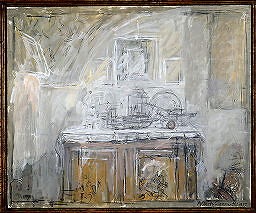
Alberto Giacometti: Le Buffet (1957)
" … grown to annoying dominance …"
Honing work—and perhaps all work—exclusively occurs in InsignificantIncrements. Each piece initially reeks of insignificance and even accumulated into bunches, rarely seeming like very much. My Weekly Writing Summaries, which I push out early every Friday morning, sometimes seem to approach significance. Still, even those seem comprised of more grunt work than any casual reader might suspect. I've come to dread Thursdays, the end of my writing week, because they always bring this obligation which I swear is sacred but the creation of which most often feels perversely secular. I buck up and perform my work as if it might eventually prove meaningful, though I also compose it exclusively in InsignificantIncrements. Any thought I might be up to anything grandiose fails to pass my Smell Test.
Once I manage to accumulate ninety of my stories into manuscripts, I once thought those might rise to some level of significance, but those, too, prove to be stunningly banal in creation.
StrategicHesitating
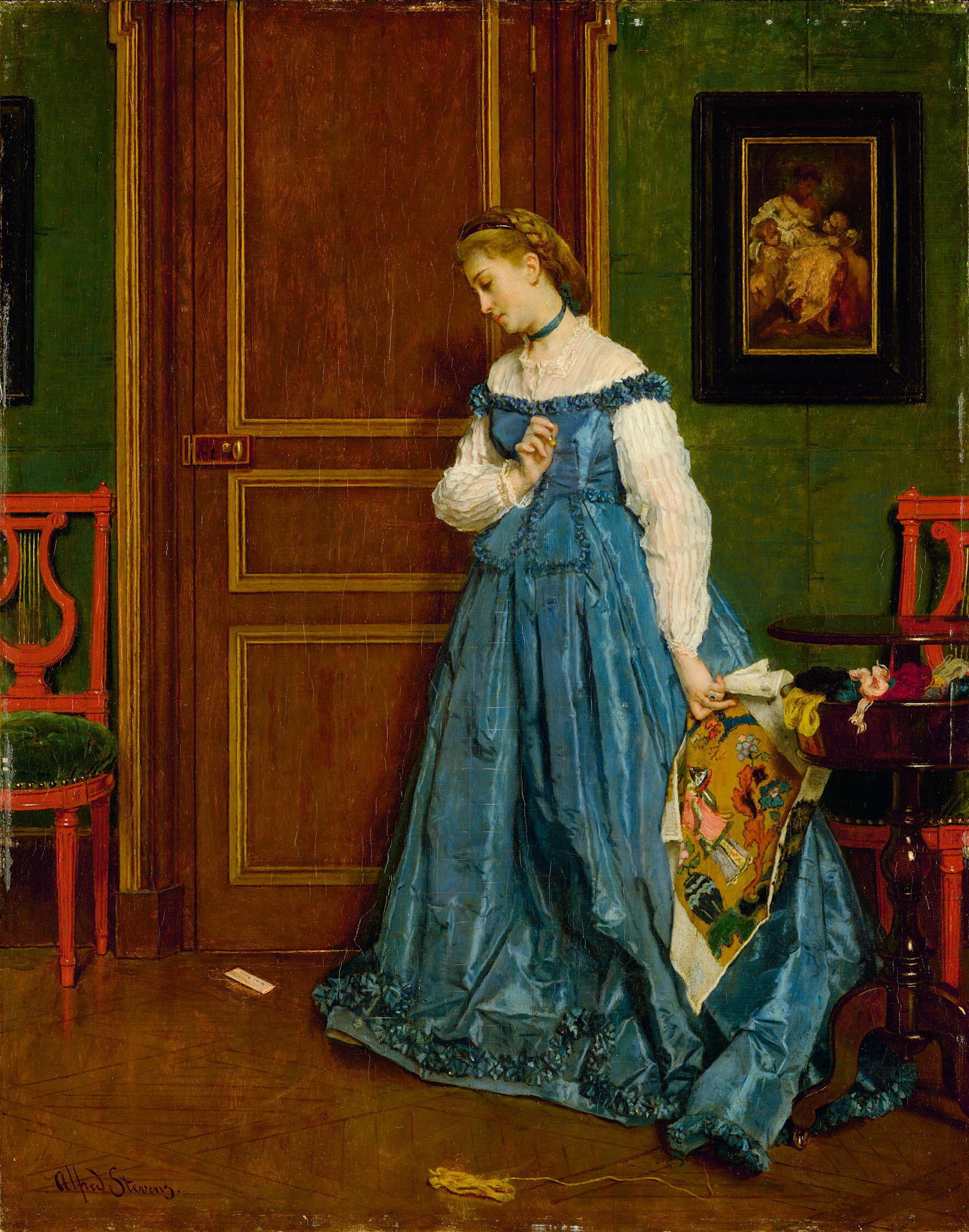
Alfred Stevens: Hesitation (Madame Monteaux?) (c. 1867)
" … obscured in utter ignorance.#
#
After receiving the fifth follow-up advice for fixing my hash mark difficulty, I engaged in StrategicHesitating. I rarely immediately follow up on any instruction. I ruminate on it first. I was not interested in a quick fix, for in my experience, quick fixes tend to encourage downward spirals where I end up in deeper and more mysterious trouble than I had before I'd asked for assistance. I need to circle the solution first. As I did in this instance, I will pretend to implement the fix, accessing the seemingly appropriate pages but not saving any adjustments. I wanted to determine what would happen if I saved the changes without exposing myself to the risk of actually changing them. I still didn't know what I was doing, but instead considered following essentially blind instructions. It's not that I didn't trust the advice, either, just that I was confident that I didn't understand the whole of it. I needed further orientation.
#
StragegicHesitating seems like a small investment.
ArrowingThrough
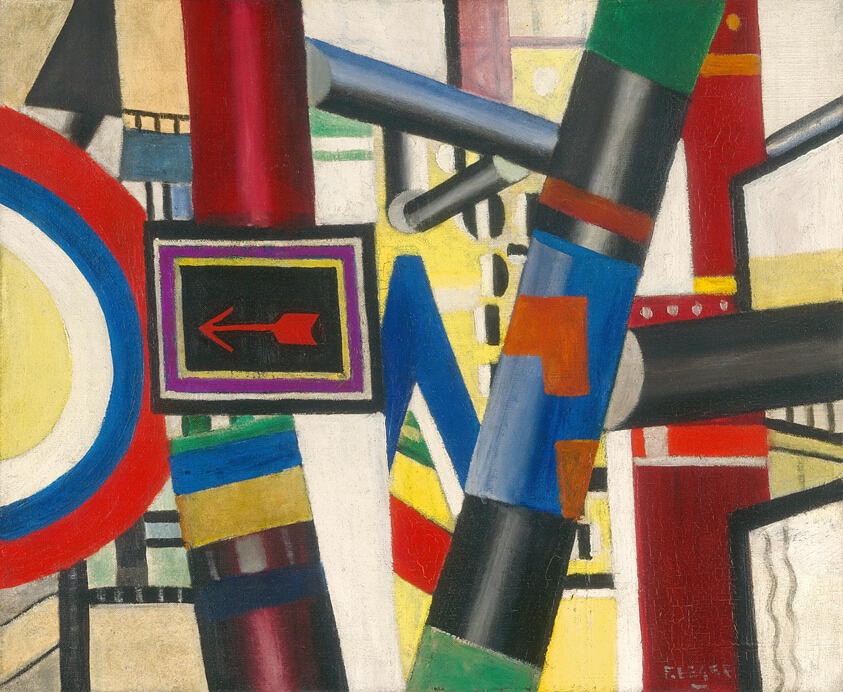
Fernand Léger:
The Railway Crossing (Sketch) (1919)
" … colleagues who don't quite understand why I don't quite understand."
Filled with the resolution of a new series, I chose to report what appeared to be a bug with my manuscripting system. I often work around shortcomings with software because I've been run around the block enough to understand that I'm probably misusing the system. Its keepers do not always warmly receive my reports. They often blame the messenger. Not that this messenger was ever necessarily blameless, mind you, but the interactions can feel abusive and are not always conducive to progress. Most of the systems I use feature areas where I, by experience or habit, refuse to go. I've learned that some functions work for others but not for me. I've grown to understand that I very likely misuse every system I employ, not just because they were seemingly designed backward, though most were. I cannot recall one I've used that was designed forward.
So, it was with circumspection that I reported this shortcoming.
WritingSummary 06/22/2023

Attributed to Elisabetta Sirani:
Young Woman Writing or Drawing
(n.d. - mid-17th Century)
Now Is The Time
There's nothing else like the enthusiasm accompanying a New Beginning. Old beginnings seem materially different because we've already traveled those routes before. The New Beginnings involve different paths and destinations, so not even our best imaginations can properly set expectations. I dream big then as if precedent were meaningless and everything might be different this time. There will be space to relearn that space and time remain relatively unchanged regardless of the charted path. We remain denizens of the same neighborhood regardless of where we travel. A new series, though, opens many doors. I already perceive my usual routine as different. I'm focusing on other things than I attended to when writing my Publishing Series. Honing might allow me to implement lasting improvements, which might even make my life a little easier. I've already created a little template that might allow me to avoid ten minutes of typing each morning. This after doing the alternative only about twenty-one hundred times. New Beginnings insist that now is the time, and so it is.
FineTuning
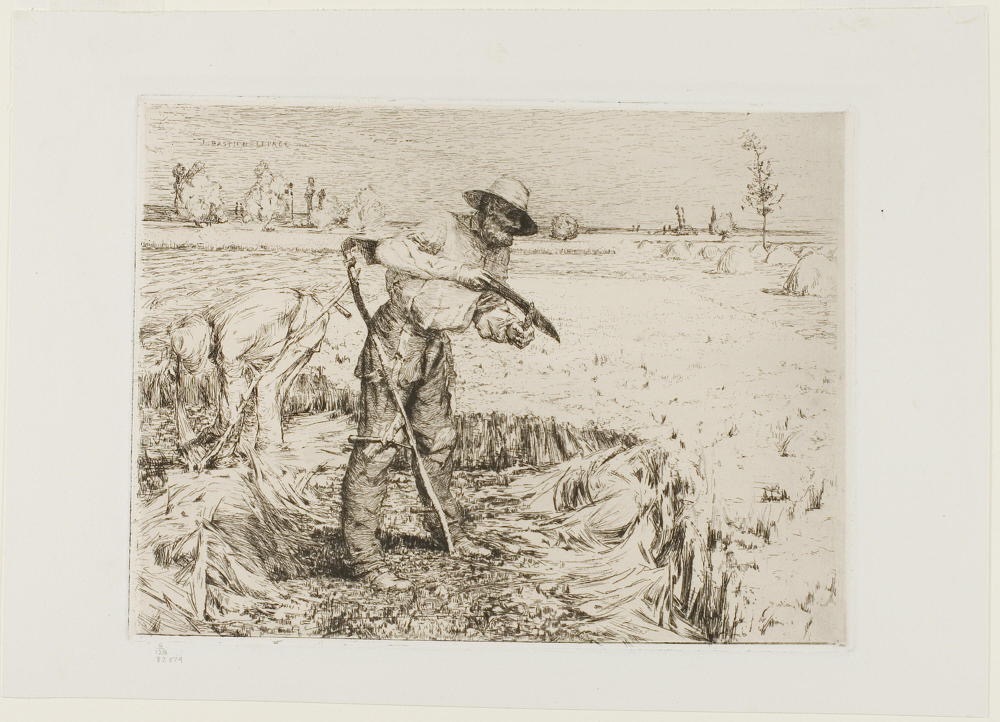
Jules Bastien-Lepage:
Mower Honing a Scythe (1878)
I woke feeling ill at ease on this first full day of Summer. I finished my Publishing series yesterday and finished reading the manuscript I'd created in the background of writing that series by midafternoon. I had yet to decide whether to continue creating a new series this morning or take an extended break to try my hand at something else for a change. The world seemed more disconnected than usual in the predawn darkness. The cats noticed that the rhythm of my morning routine had been broken. We ached together for its return. There was no more obvious cure than simply starting another series, but what topic?
I looked back at my last few series: Authoring, Reconning, Againing, SetTheory, Success, and Publishing, wondering what might serve as a natural next in the progression.
MoreBegendings
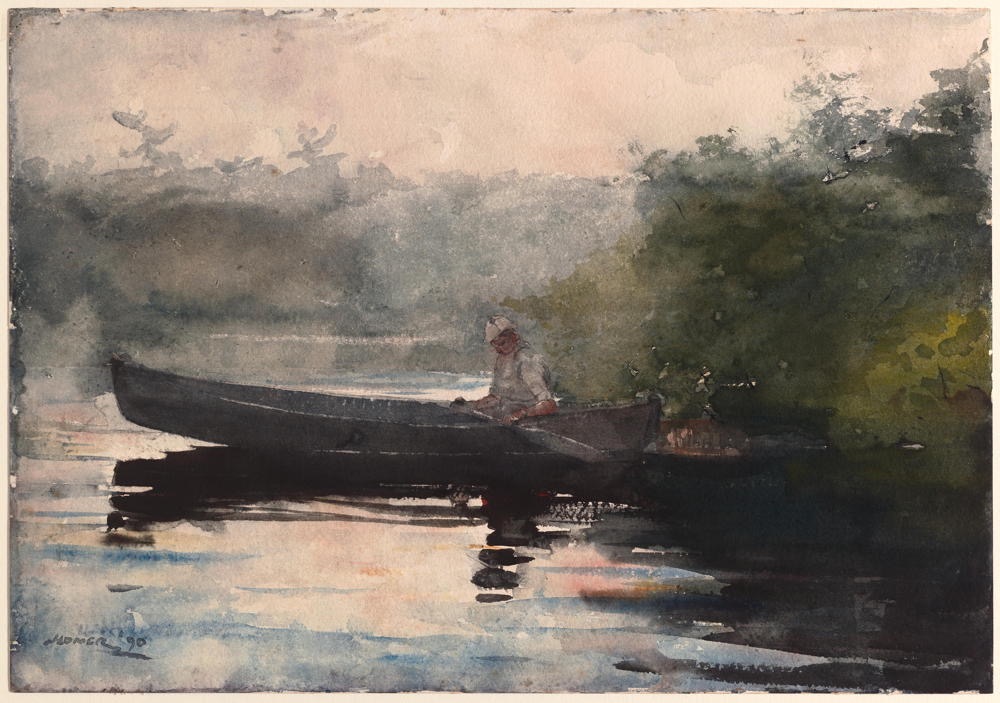
Winslow Homer:
The End of the Day, Adirondacks (1890)
" … the serious side of the practice."
Today is slated to extend fifteen hours and forty-five minutes, with sunlight visible for seventeen hours. These conditions make this the perfect day to end something. They also suggest a new beginning, for each ending abuts into whatever comes next. This day marks six years since I began this now lengthy experiment where I would try to create a new story each morning. I long ago lost the need to try very hard to accomplish this end. The stories slip out as a matter of course now. This morning, though, I wonder if this story, this final story in my Publishing Series, shouldn't be my last produced under this regimen. I began this practice following a professional disappointment and a lengthy discouragement. I thought it might prove courageous or at least foolhardy to create a story every morning to try to prove something. If writers write, it would not be unreasonable to expect me to write each morning since that's what writers do. That or else, perhaps I wasn't quite the writer I'd imagined myself to be.
I turned out to at least be the writer I'd imagined myself to be and more.
TidyingUp
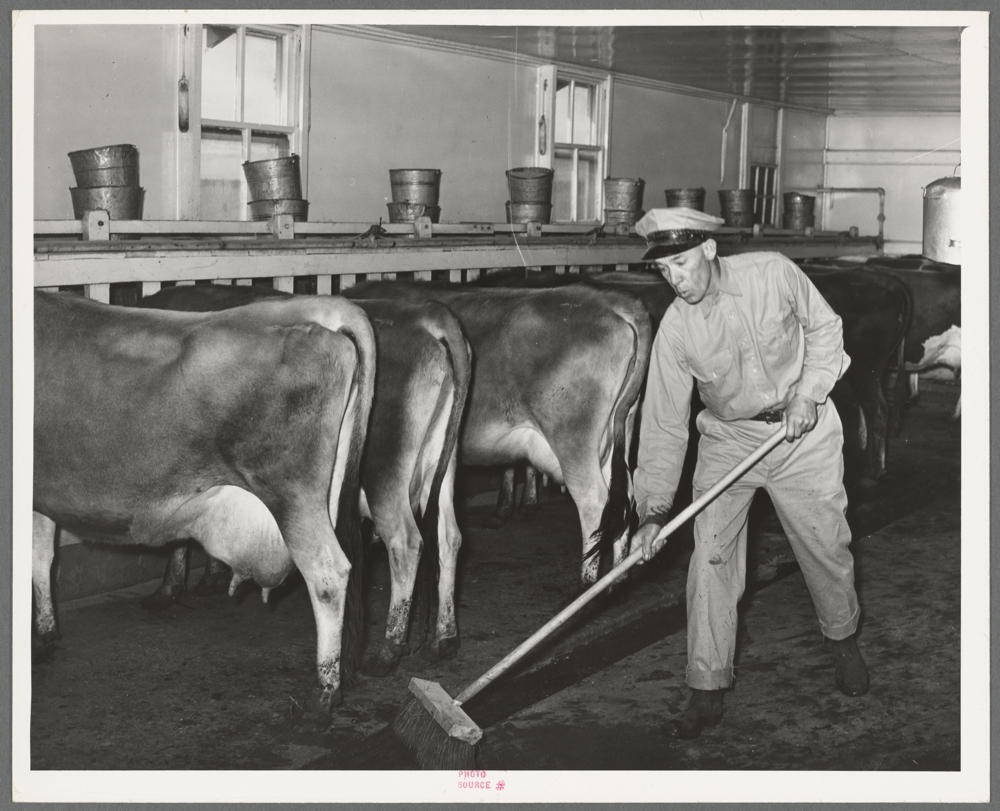
Russell Lee: Cleaning up manure in milking shed. Large dairy, Tom Green County, Texas (1939)
"It's up to the protagonist to decide what …"
Almost as if by magic, another ending arrives. The distance to the end appears impossibly long at the beginning, and it stays that way until the last few days. The morning before the final one, it might suddenly dawn on me that I never intended this series to last forever and that it, too, would be ending soon. I'm rarely ready to begin anything and even less prepared to finish. I have yet to produce what I imagined I would produce back when I chose Publishing as my theme for this quarter. I'd imagined I would have published something by now, but I have yet to. I moved closer to a point of publication, but I cannot determine for certain. I made progress preparing a single manuscript without finishing that work, though there's still time to cross that line before this series runs out of allotted time tomorrow.
Things take as long as they take.
MakingMantras
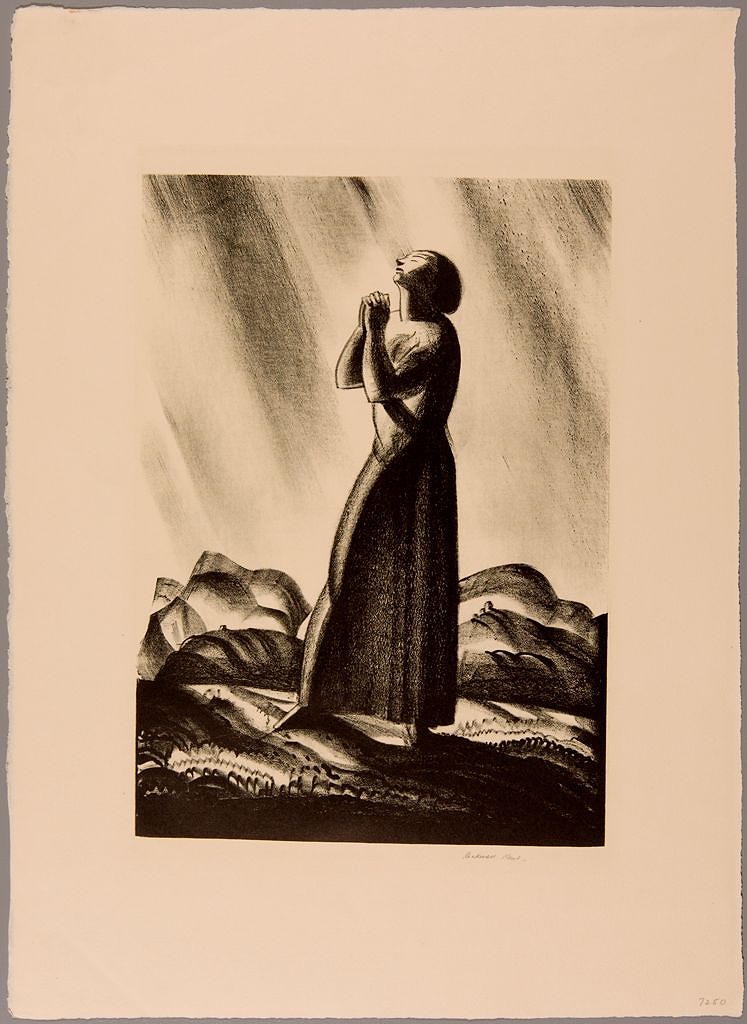
Rockwell Kent: Meditation (1929)
" … merely MakingMantras all along."
While reading beneath one of our backyard ornamental crabapple trees, it occurred to me that reading works like meditation. It seems to focus attention away as well as within, into, and without, the purpose often in doubt. I was reading a biography of John Singer Sargent, but it hardly matters the reading matter's content, for any words might encourage identical contemplations or self-similar ones. However thoughtfully crafted, the book and its contents do not serve as the sole or even the primary purpose of reading. They serve as mere mantras for the focus. They exist as context.
I was raised to believe—or somehow convinced myself—that the book was the object, the stuff that Publishing produced, but I might have been mistaken.
AngryArm
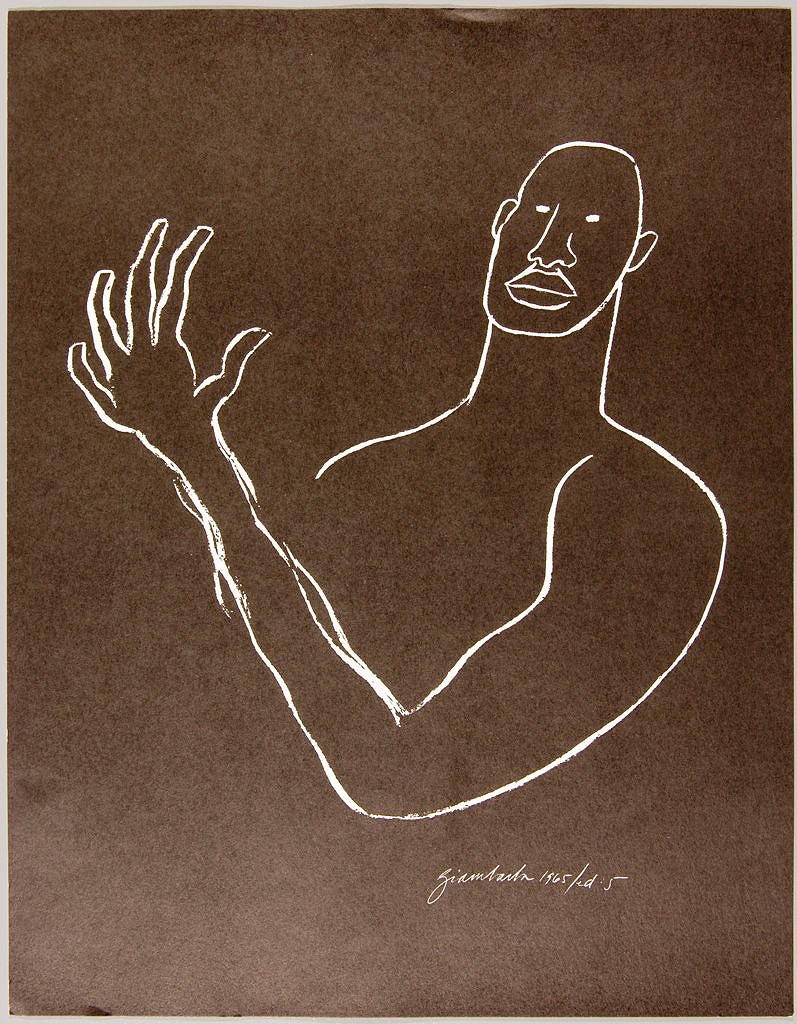
Paul Giambarba: The Withered Arm (c. 1960)
" … no fixing in the immediate offing."
I am taken by how much foreground attention even a superficial wound can command. The Vengeful god residing in my arm leaves it feeling angry and complaining whatever I do. I suddenly seem incapable of accomplishing anything without further insulting that AngryArm. I cannot play catch with my grandson without wounding the thing, so I decline to play. I cannot do anything without incurring more damage. As the list of things I cannot do without wincing continues growing, I wonder where all this might be going. The doctor who diagnosed the ailment (Deltoid Bursitis for those not paying close attention) wrote me a script for a ninety-day supply of remarkably ineffective pain medication. This prescription suggests that he anticipated a longer haul than a short one. I might be hosting this AngryArm for some considerable time to come. I try but fail not to think about this.
Now, everything seems influenced by the presence of this AngryArm, even my Publishing efforts.
TheIllusion
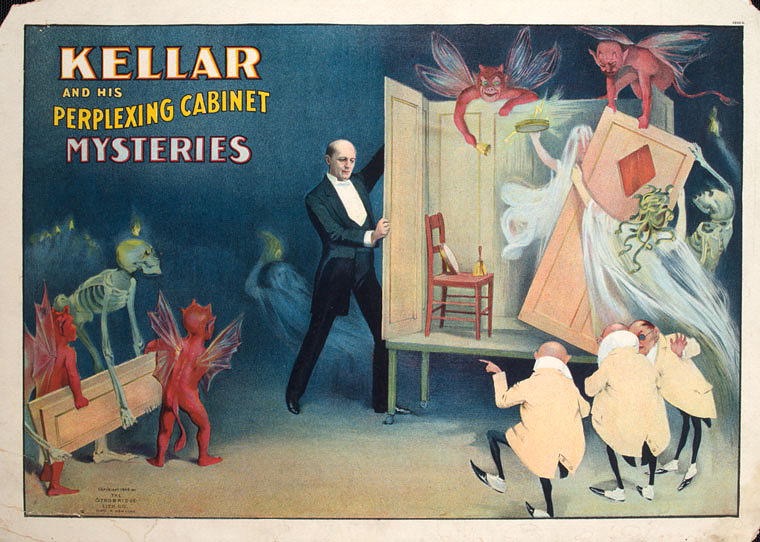
Strobridge & Co. Lith.:
Kellar and his perplexing cabinet mysteries (1894)
"The problem with communication is the illusion that it's occurred."
a common bit of folk wisdom
Publishing serves as a means of communication, and as such, it's subject to all the laws governing it. Primary among those laws might be TheIllusion, TheIllusion that it occurred. We inhabit the pointy end of eons of development of our communication channels. The very best I can claim about any of them might be that they're still subject to the same illusion that communication ever occurs. I famously struggle to keep up with my email, for instance, whatever 'keeping up' might entail. I understand that the probability of me receiving and comprehending any individual email as its sender intended remains slight, almost zero. The Muse is forever discovering that I never received the message she forwarded to me last week and, upon researching the cause, typically finds the message right where she had thought it would be, sitting plaintively in my email queue. It had somehow slipped by me without my noticing. Independent of her intervention, I never would have "received" it. It's the same for everybody.
Face-to-face oral communication seems just as likely to surprise and fail.
Vengeful
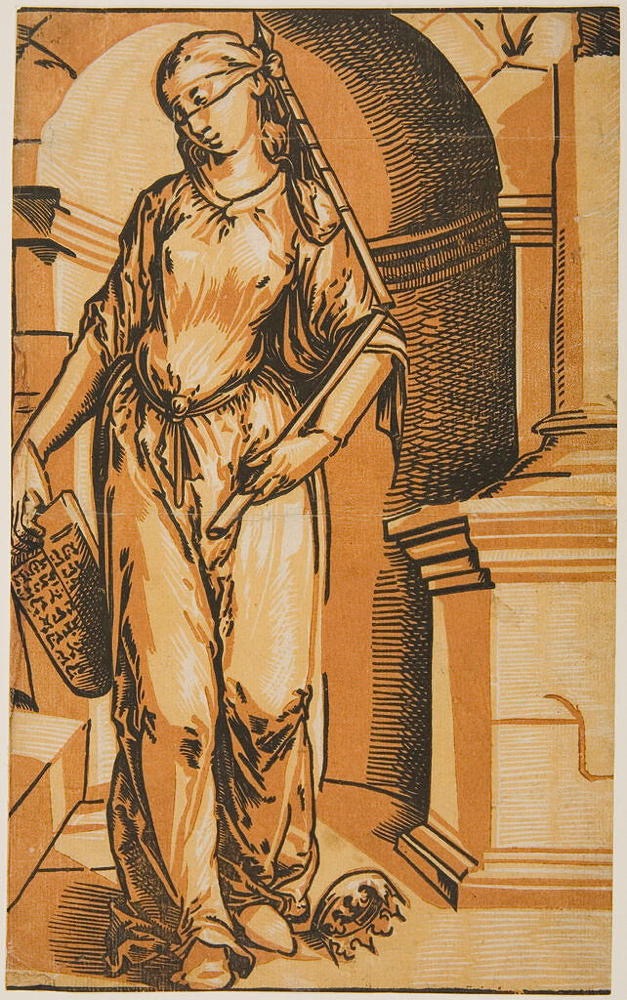
Tobias Stimmer:
Allegorical Figure of the Old Testament
(16th century)
" … one uninterested in unrequested eye removal …"
If I were to become a God, I'd choose to be a New Testament one. In the Old Testament, God seems grouchy in comparison and Vengeful. Nobody appreciates Venge. We believe those exhibiting Venge are full of it: Vengeful. Fortunately for you and me, I'm unlikely ever to receive the call emploring me to fill in, even for a long holiday weekend, for God The Father, Mother, or Other. Ain't happening. I mention this distinction between a mortal and God because of the allegory currently performing daily in my right shoulder. It occurred to me that what my doctor called Deltoid Bursitis is a dandy example of Vengeful in practice. I had been blissfully unaware of the existence of bursae until a yardwork over-exertion left me with a Vengeful God inhabiting my deltoid. What had been installed to assist the operation of a complex joint became the very model of a Vengeful God in practice.
My bursa remains ever watchful. He monitors my motor activity.
WritingSummary: 06/15/2023
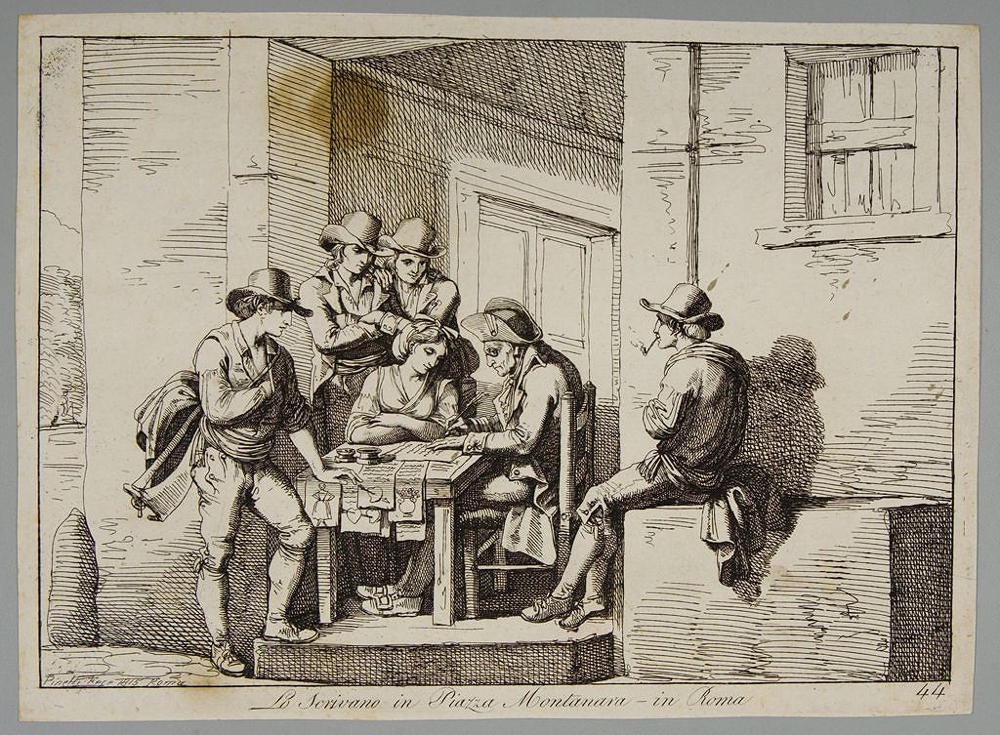
Bartolomeo Pinelli:
The Letter-writer in Piazza Montanara in Rome
(19th century)
We Inhabit Middles.
I realize I've already completed this series's final whole writing week. It might reasonably continue forever, and just how arbitrary was my decision to dedicate only a quarter to considering my Publishing issues. I've scratched some surfaces, some severely, but I surely leave remaining more questions than I've investigated. Each subject, each focus, seems to open something infinite within us. Yes, we might well find a universe within any old anything, for our curiosities reveal tremendous self-similarity. Each part of any infinite must also represent its whole; a piece of infinity might well seem indistinguishable from the total, smaller infinities retaining their context's character. Each writing week might be destined to fall short and leave more questions unanswered, but no amount of writing—or anything—looks very likely to ever get to the bottom of anything. We inhabit middles.
20YearJob
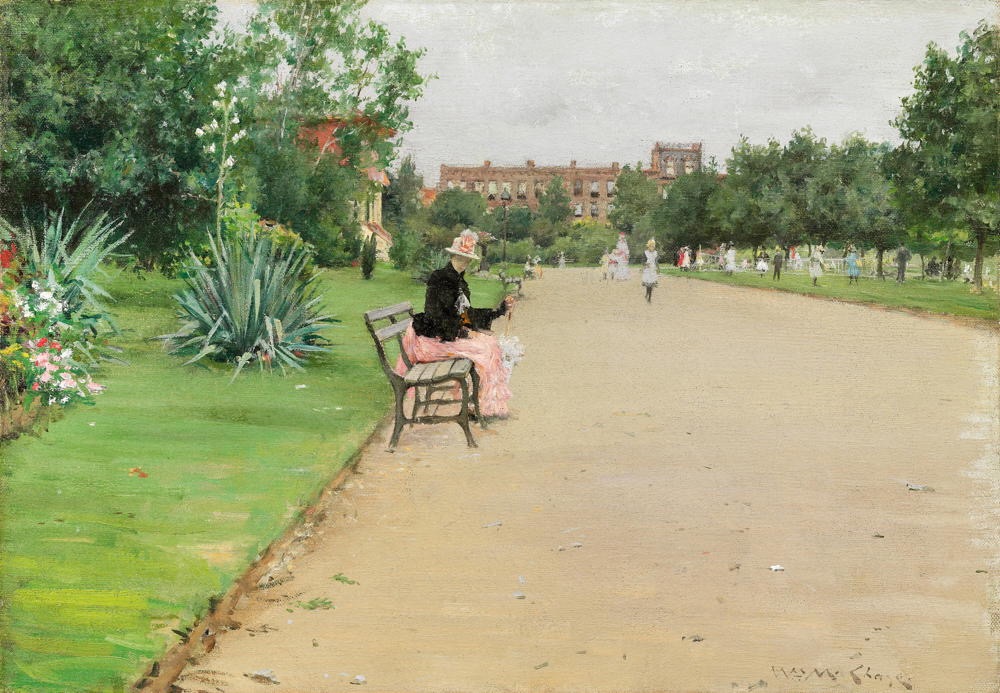
William Merritt Chase: A City Park (c. 1887)
" … knowing that probably nobody will notice."
Most of my work seems short-lived. Mowing the lawn, for instance, buys me, at most, a week's reprieve from needing to mow the lawn again. Cleaning up the kitchen extinguishes in mere hours. According to my schedule, my writing, which I sometimes think of as eternal, must be added to each morning so its reprieve extends less than a day. If I finish writing a story by six am, another aches to be born by four the following morning. House maintenance work tends to run on much longer cycles. One repaints infrequently, often a few years after it becomes absolutely necessary. I think of it as a 20YearJob, one for which I will be much older by the time it needs refreshing. It might take me three or four years to entirely paint the Villa exterior, so it’s good that its frequency moves more like an ice age.
Yesterday, I finished refinishing three cast iron-framed park benches The Villa's prior owners left behind when they moved.
Rapt
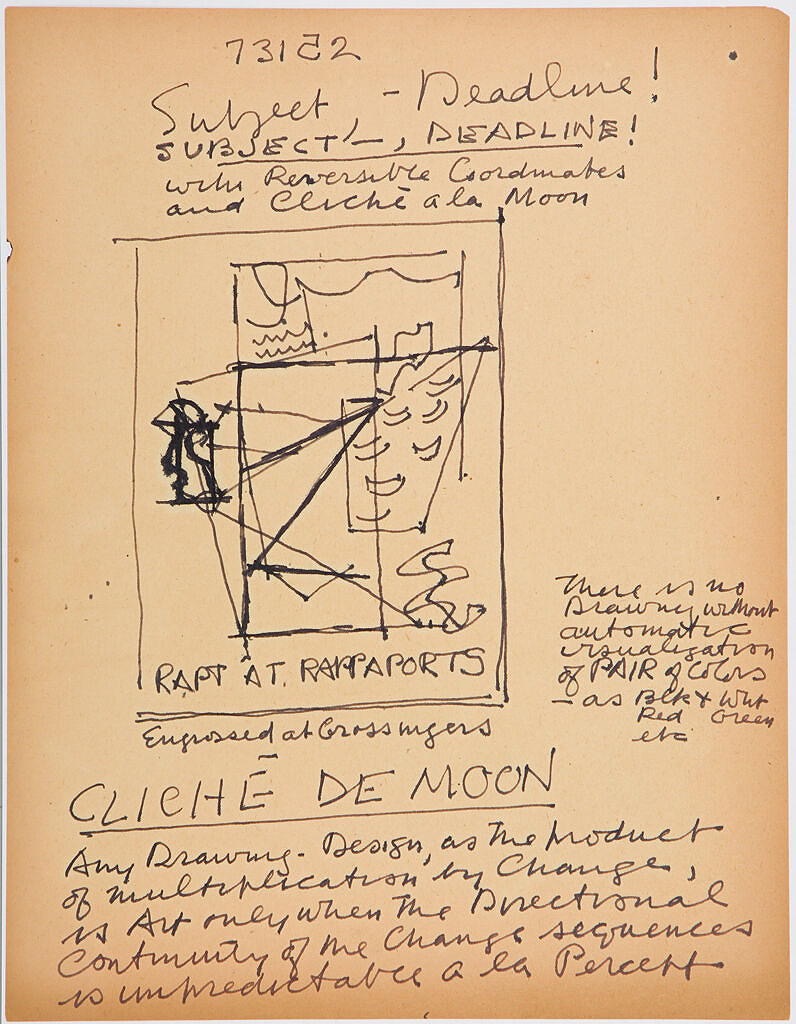
Stuart Davis: Study for “Rapt at Rappaport’s” (1952) 
Stuart Davis: Rapt at Rappaport's (1952)
"Publishing ain't whitewashing …"
Writers and editors long ago acknowledged that authors make lousy proofreaders and copyeditors because they're too involved with and invested in the object of their efforts. One would never dream of employing any craftsperson as their quality control inspector, for use demands a separate set of imperatives than fabrication ever does. The maker should fall under a thrall with his creations, ardor which properly disqualifies them from passing sound finishing judgments. While creating my latest manuscript, I harbored deep doubts about the product of my effort. Well into the first third of the project, I complained that I had not yet found the rhythm of it and openly wondered if the concept possessed any inherent rhythm within it. Only when I was more than halfway done did an underlying logic emerge. Then I became more protective than critical, more the father than the humble subcontractor.
A form of evolution governs the creation of a finished work.
HearingMyselfThink

Follower of Frans Hals:
The Rommel-Pot Player (c. 1630)
"Nobody ever discloses greater secrets."
I believe, without hard evidence, that we each maintain a unique dialect of how we think. Unrelated to physical speech patterns, this manner of speaking to ourselves results from a lifetime of considering in the most personal possible ways. This voice accompanied us on our most harrowing as well as our most reassuring excursions. It was, quite literally, there then and remembers. It guided most of the figuring out we've ever accomplished. We might just as well consider it our most trustworthy friend.
It's a great gift when we're able to HearOurselvesThink.
Contact

Follower of Peter Paul Rubens:
The Apotheosis of the Hero (1630/40)
"We'll see where that takes us."
A year ago this week, a publisher contacted me to see if I might be interested in working with her organization. I reluctantly receive such calls because the caller often feels compelled to pressure me into agreeing to something before I understand the offer. Nobody appreciates feeling pressured into anything, so I feel baffled about why anyone relying upon persuasion or merely information to sell something would ever resort to pressuring anyone, but they do. I always ask for more details, paper if they've got it. I want to slow down the interaction so we might get to know each other before moving on to first or second base.
I've noticed a similar strategy at work when investigating the purchase of software.
Harbingers
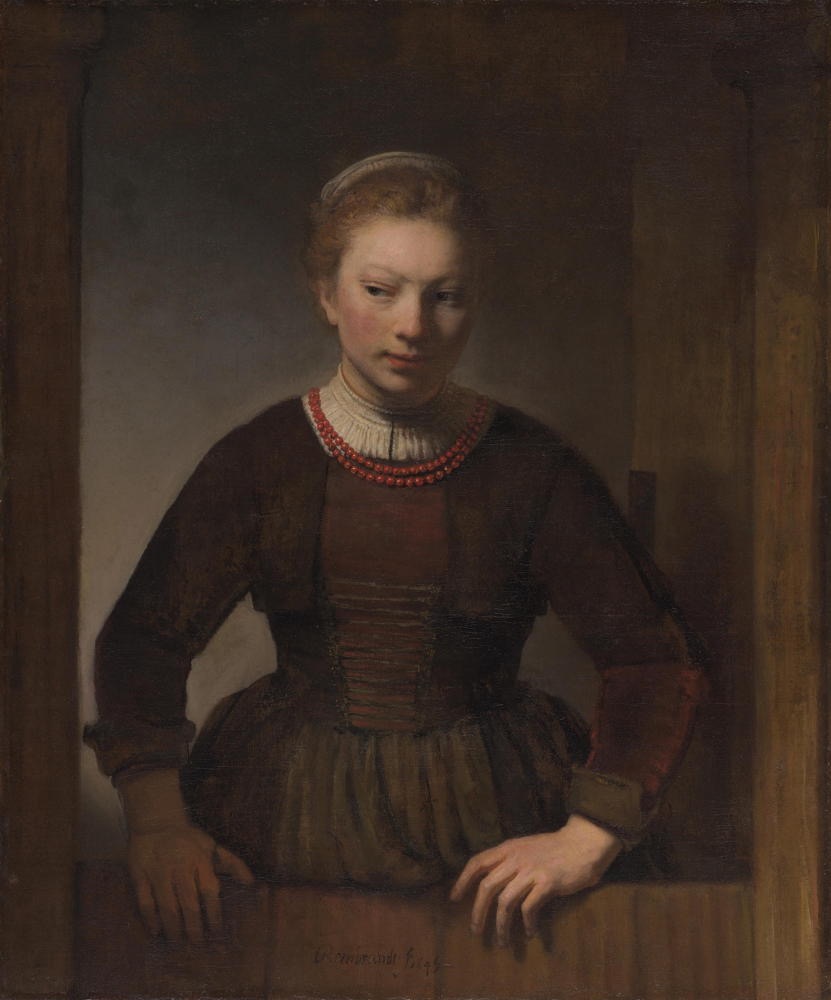
Rembrandt Harmenszoon van Rijn and Workshop:
Young Woman at an Open Half-Door (1645)
“The outcome should properly prove surprising …”
The immediate care doctor reassured me that my latest ache need not be a Harbinger of things to come. It represents a strain that, properly treated, need not become chronic or recurring. I wonder, though, when aches and pains appear, whether they're here permanently, for good, ill, or whatever. In my youth, I imagined that aches and pains amounted to karma, just desserts due to some prior shortcoming or committed sin. Smoke for fifty years and see what happens. But as I've aged, I might have started learning better that much misfortune visits without an antecedent rhyme or reason, without representing anything but fortune. "It just happened" probably explains more than all the root cause analyses in the world. I still wonder which of my maladies might become permanent companions and which might reasonably disappear over time.
A month ago, I could quack like a duck, even flap my right arm wing-like in unison.
WorkingWounded
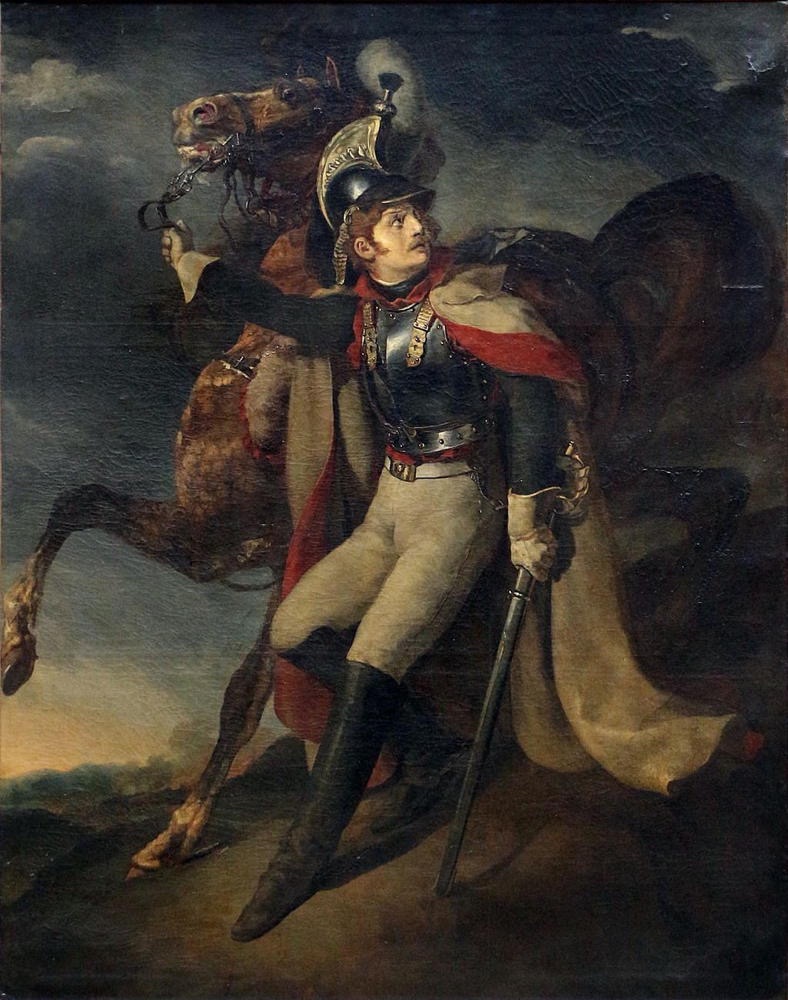
Théodore Géricault:
The Wounded Cuirassier
[French: Le Cuirassier blessé quittant le feu] (1814)
" … because that's what I do."
I admit to a certain degree of DIYdiocy. I do more than attempt to Do It Myself but sometimes seem to be actively engaging in Doing Myself In! A month or more ago, I finally set about cutting up those shrub trimmings clogging the driveway so that I could stuff them into the green waste can. After that work, an annoying ache took up residence in the region of my right deltoid, a shoulder muscle. I could manage that pain with regular doses of Ibuprofen and did. I tried to avoid activities that annoyed that spot, though just moving my arm laterally up or down could elicit a wince. I added some dedicated rest periods to my schedule and continued.
Repainting the back deck railings and superstructure brought fresh insults to my wound.
FallingInto
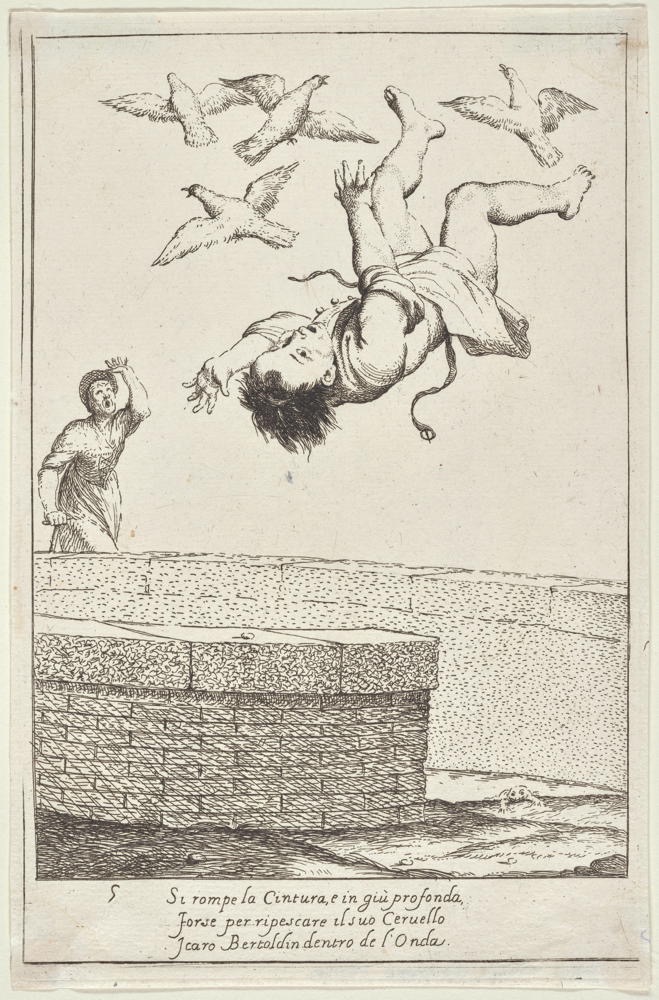
Giuseppe Maria Crespi:
Bertoldino Falling into the Fish Pond (c. 1665-1747)
"How could I not continue?"
I prefer to think about the future as something I'm FallingInto. I understand the more popular notions insisting that we create and craft or design our futures, but those operations seem severely limited. Whatever my intentions or preferences, I might, at best, be able to choose my seat. The destination's almost always out of my control. This goes double for those engagements where I've taken charge of creating something. My influence, even under those conditions, seems at best secondary. Writing my current manuscript only came about partly by design. An awful lot of happenstance guided my hand. Much of my effort was only partially consciously driven. Writing anything includes elements perhaps best described as coming together. Set up a context, and much just follows. Any practice depends upon gravity guiding some FallingInto.
I do not suggest that I am mere flotsam. I exert great influence, just not as great and not necessarily to the degree I imagine.
WritingSummary: 6/08/2023
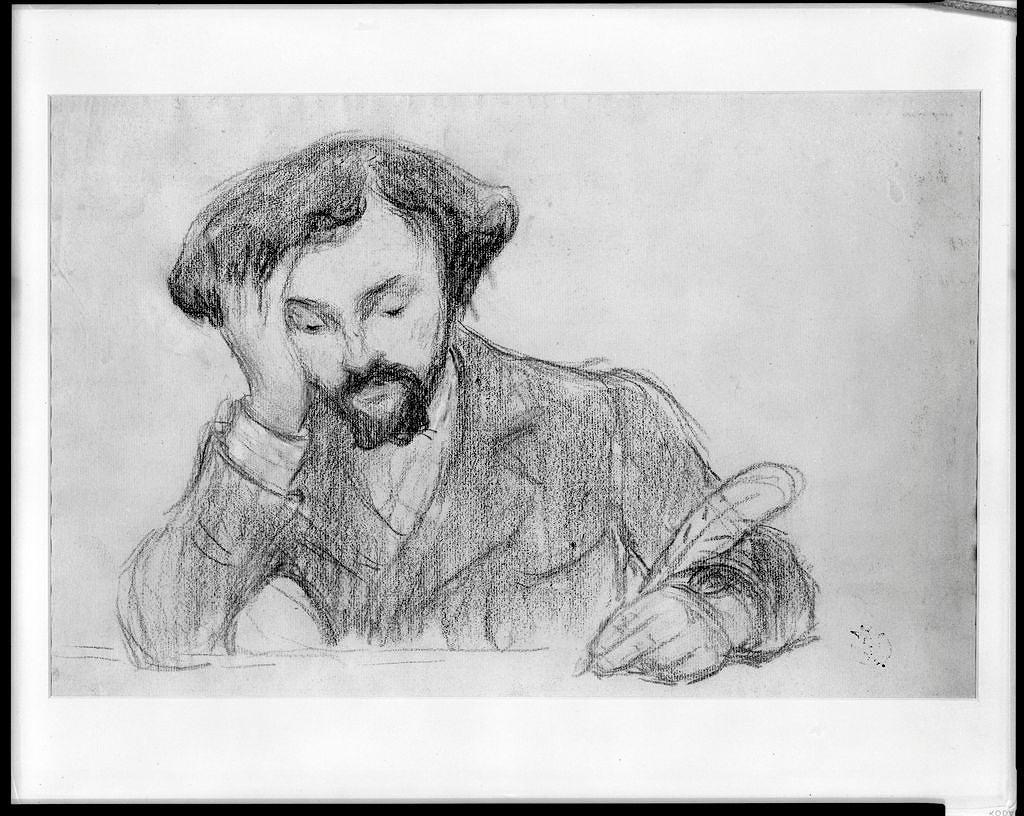
Claude Emile Schuffenecker: Portrait of a Man Writing (19th-20th century)
If Irises Carried Grudges, Our Winters Would Never End.
I feel as though I made little progress this week, what with all the diversions and distractions presently haunting me. I might be blessed with so many interesting sidelines, but the ancient Chinese curse about living in interesting times echoes in more than just the background; it accompanies the foreground, too. Our front yard iris garden might best represent this writing week. This time last week, dozens of blooms graced the otherwise barren flowerbed. Now, only desiccated fronds remain a week later, and memories of those brilliant colors and alluring scents. Iris season lasts at most ten days, yet they require tending through the entire year. In winter, careless joggers and dog walkers tromp right through their territory. Come Spring, the unpromising plants come to reassuring life again, forgiving our many trespasses, each of which we most probably unknowingly visited upon ourselves. If Irises carried grudges, our winters would never end.
CriticalEar
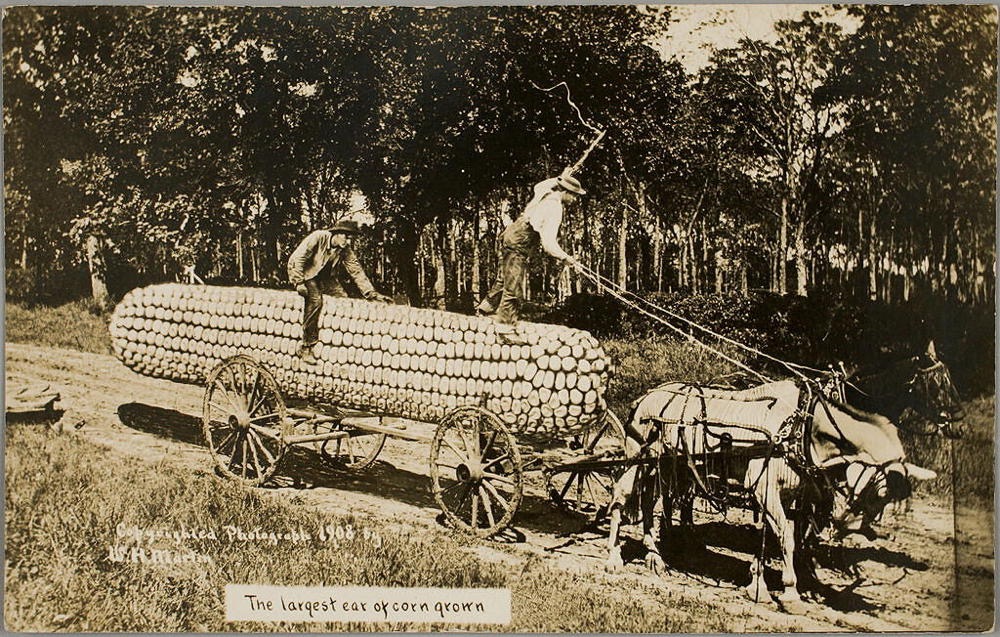
William H. Martin: The largest ear of corn grown (c. 1908)
"I might have to smother it if I expect to succeed."
I get an earful when preparing my manuscript for Publishing. I listen to the stories in different ways than I listened to them just after writing them, and also different than I did while assembling them. Once assembled into a contiguous whole, I hear different voices than I remember hearing before. After so many repetitive listenings, my ear had learned to become more critical. If I'm not careful, and perhaps even if I manage to become really careful, my ear becomes critical. My prose relies upon a certain innocence from listening ears. Experienced through a critical filter, it seems to need endless reworking. It could have been simpler, my suddenly CriticalEar suggests. It could have been more eloquent. There's no end to the little improvements the later listenings suggest, just to be helpful, only to enhance.
I'm experienced enough to understand that the time for wholesale improvement has already passed.
Diversions

Michael Wolgemut and Workshop
published by Anton Koberger:
The Virtues of Christ and the Wickedness of His Enemies
Symbolized by Diverse Birds and Beasts (verso);
The Last Supper (recto),
pages 66 and 65 from the Treasury (Schatzbehalter) (1491)
"… another good or great intention …"
Nexts tailgate my Publishing efforts as I move ever closer to concluding them, or I would be moving ever closer to finishing them were it not for the nexts crowding ever more closely and diverting my attention. I'm painting the back deck, by which I mean that I'm painting everything associated with the back deck except the deck surface, which was fabricated out of melted milk jugs and doesn't need painting. The railings and pergola-like superstructure above need repainting, so I set about to sand, wash, and sweep before settling into painting, a three-coat diversion that might take me a week to complete, what with the other diversions swarming my space. I started arranging to buy some tee shirts yesterday in lieu of painting and also instead of Publishing because The Muse is running for public office, Port Commissioner and I'm her campaign manager. Buying tee shirts pretty much marks the official start of her run. I'd been feeling delinquent because of all the Diversions lately tailgating my every movement.
I'll make no excuses or no concerted ones.
TechSupport
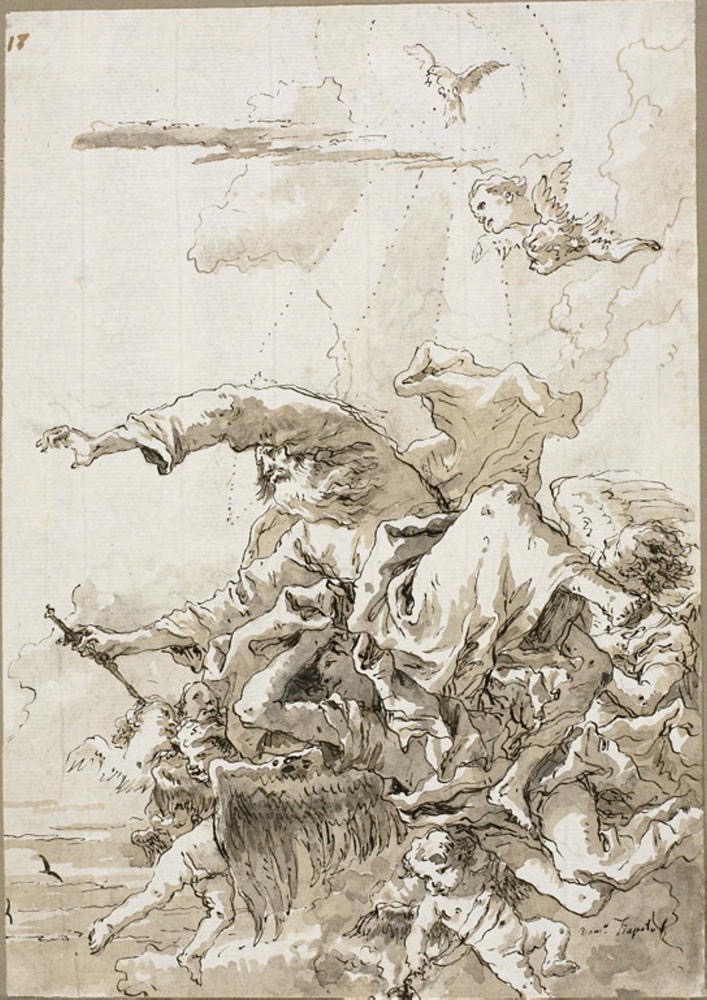
Giovanni Domenico Tiepolo:
God the Father Supported by Angels in Clouds, II (c. 1759)
"I once insisted that I would somehow maintain my naive state …"
I foolishly swore an oath when I was first introduced to what I referred to then as Barbie and Ken Computers. I referred to the so-called personal computers, those handy, steadily shrinking little machines we're not supposed to take too awfully seriously but do. My oath insisted that I would do everything in my power to remain a naive user of the damnable little things because I'd seen otherwise sentient beings disappear into some passionate swirl of technical engagement. Whether that attention went into coding or merely formatting didn't matter. My nonrefundable time mattered to me, and I swore my oath in the naive belief that I might somehow possess the power to make good on it, which, of course, I didn't.
To engage with technology inescapably transforms anybody into their own TechSupport.
TeachingMyself
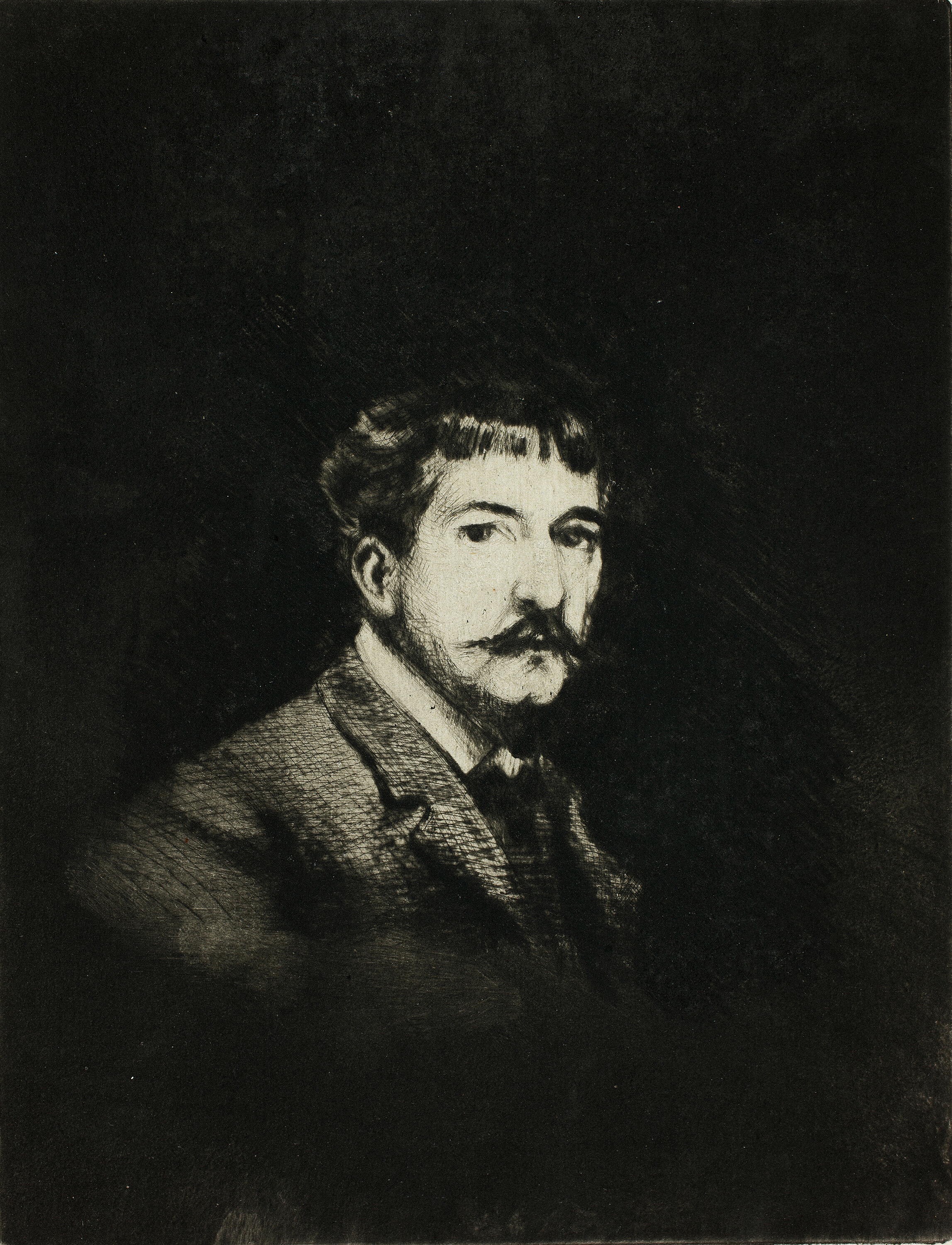
Theodore Roussel: Portrait of Myself (1901)
"Teacher, teach thyself."
What sort of book have I written? What does this manuscript aspire to become, and what have I achieved by creating it? These questions dominate my internal dialogue as I listen to this almost-finished work for the very first time after spending months producing it. The story–the narrative arc—seems familiar but not overwhelmingly so. I only sometimes know where each story's going from its beginning, for I seem to have been blessed with a remarkably short memory. Each story's conclusions also seem familiar, though I often feel that I hadn't previously recognized some aspects. I often think the endings, in particular, exhibit a certain eloquence, a sense of accurately summing up something, but what am I reading? Fiction or non? Biography or vanity? Gibberish or wisdom or some tragic combination of the two?
The work seems just fictional enough to hold attention, though I based most of the stories upon actual events, however embellished.
StoryTime
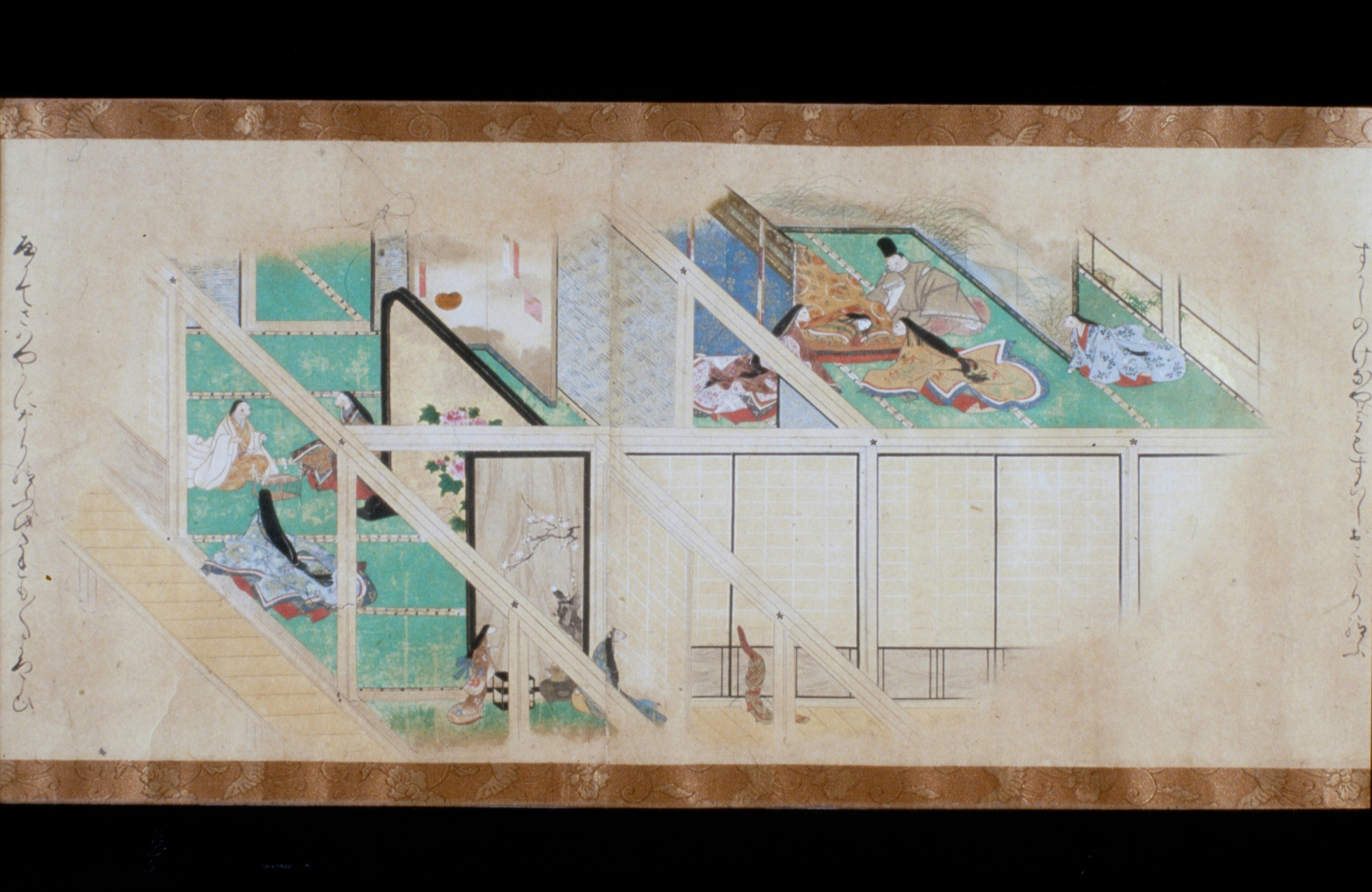
Attributed to Sumiyoshi Jokei:
A Story of Crickets (second half 17th century)
"The sweetest dreams always came before sleep …"
When I was a child, StoryTime was my favorite time of any day. My dad used to read to his children. We'd gather around, me often perching on the back of the couch, for the first imperative would always be to get just as close as possible to the narrator. The little sisters tucked in closest. He'd smell of aftershave. His baritone resonated whatever he recited. He was one of those who could read the stock market report to rapt audiences; the story's content always seemed much less important than his performance.
But even when he was unavailable to read, someone would read aloud, the older sister or even the youngest one when she was first learning to read.
MindSetting

Adolf Hohneck, After Gustav Friedrich Schlick:
"My Peace of Mind is gone" [Faust] (1834)
"I could found The Truly Terrible Publishing Company to distribute my mediocre works out into an already grossly over- stuffed marketplace featuring ever fewer interested consumers." from my Success Series, TheGames, 12/26/2022
Sitting down to finally read through that freshly compiled manuscript proves impossible. Its author feels guilty instead. He senses he might be better off if he just skips reading through the result. He expects not to like what he's created as if the mere act of reading it could only disclose a previously undetected fatal error. If he was to be honest with himself, he could only reject the work and relegate it to history's ashcan, humiliated. So instead, he dances around the job, grateful he doesn't have a printer powerful enough to render its three hundred-plus pages to paper. He distracts himself, busying his attention elsewhere, hiding out. He cannot find an appropriate mind with which to engage in this work. He consequently feels justified in just shirking this necessary next step.
Perhaps he could just move to assembling the next series in line and become, rather than published, more accomplished at assembling, a necessary skill in the vast Publishing world.
OldWeaknesses
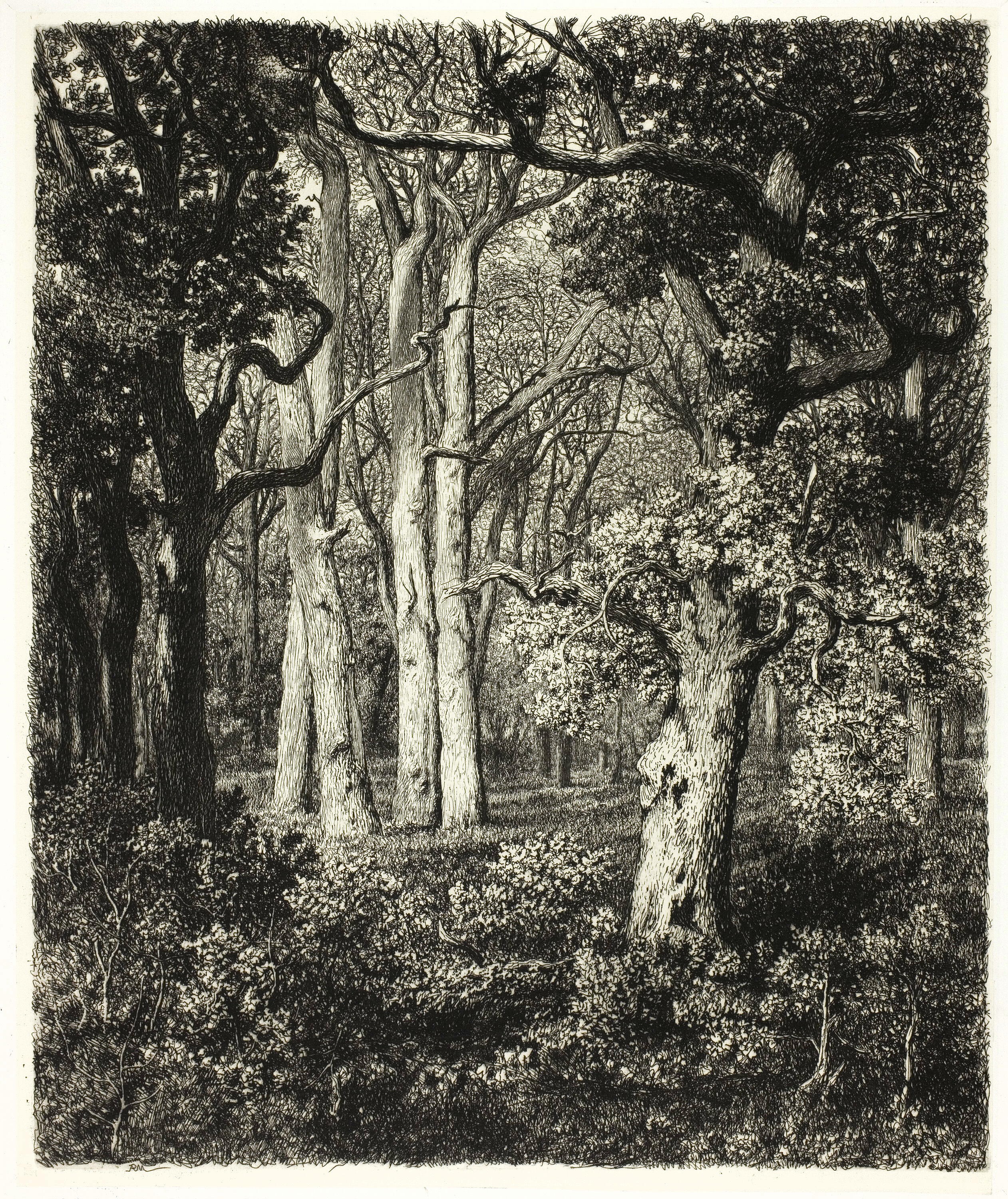
Adolphe Martial Potémont:
Old Oaks at Bas Bréau (c. 1865)
“ … shamelessly incorporating our OldWeaknesses …”
I remain a change skeptic. I see clear evidence of change but perhaps clearer evidence that nothing very drastically changes. I remain who I always was, changes in context probably contributing more to the appearance of change than to any substance. I remain distinctly recognizable, even if my once girlish figure has disappeared into belly and sags. I still feel fairly youthful for my age. My OldWeaknesses remain if more contained than they were at times. My tastes have expanded some. My palate more refined. My experience clearly greater, but the unknowns still far outnumber the knowns, and my unknowables seem essentially unchanged across decades. I remain remarkably contained.
I suspect that my OldWeaknesses are my secret strengths.
WritingSummary: 6/01/2023

Johann Andreas Benjamin Nothnagel:
Hermit Writing (18th Century)
A Decent Chance Of Becoming Requitable
Now that I've finished assembling my manuscript, my schedule allows me some distractions and respite from that all-consuming focus. I became a wannabe handyman again, entering The Home Despot only to have my desires dashed by the harsh realities they almost exclusively dispense there. Between that visit and a following one to a lumber yard, my grand plan to accomplish something besides manuscript assembling fell apart. I took these experiences particularly hard, for tight on the sense of success completing assembly had brought; I'd thought myself invulnerable to disappointment, only to learn better, by which I, of course, mean worse. I realize that my small successes influence little, almost nothing, yet they still feel consequential, at least until this old world starts dispensing its usual disappointments again. Again, I'm reminded of why I became a writer. It allows me to inhabit a world primarily of my own making, where my notions of what's possible hold a decent chance of becoming requitable.
OnSpec
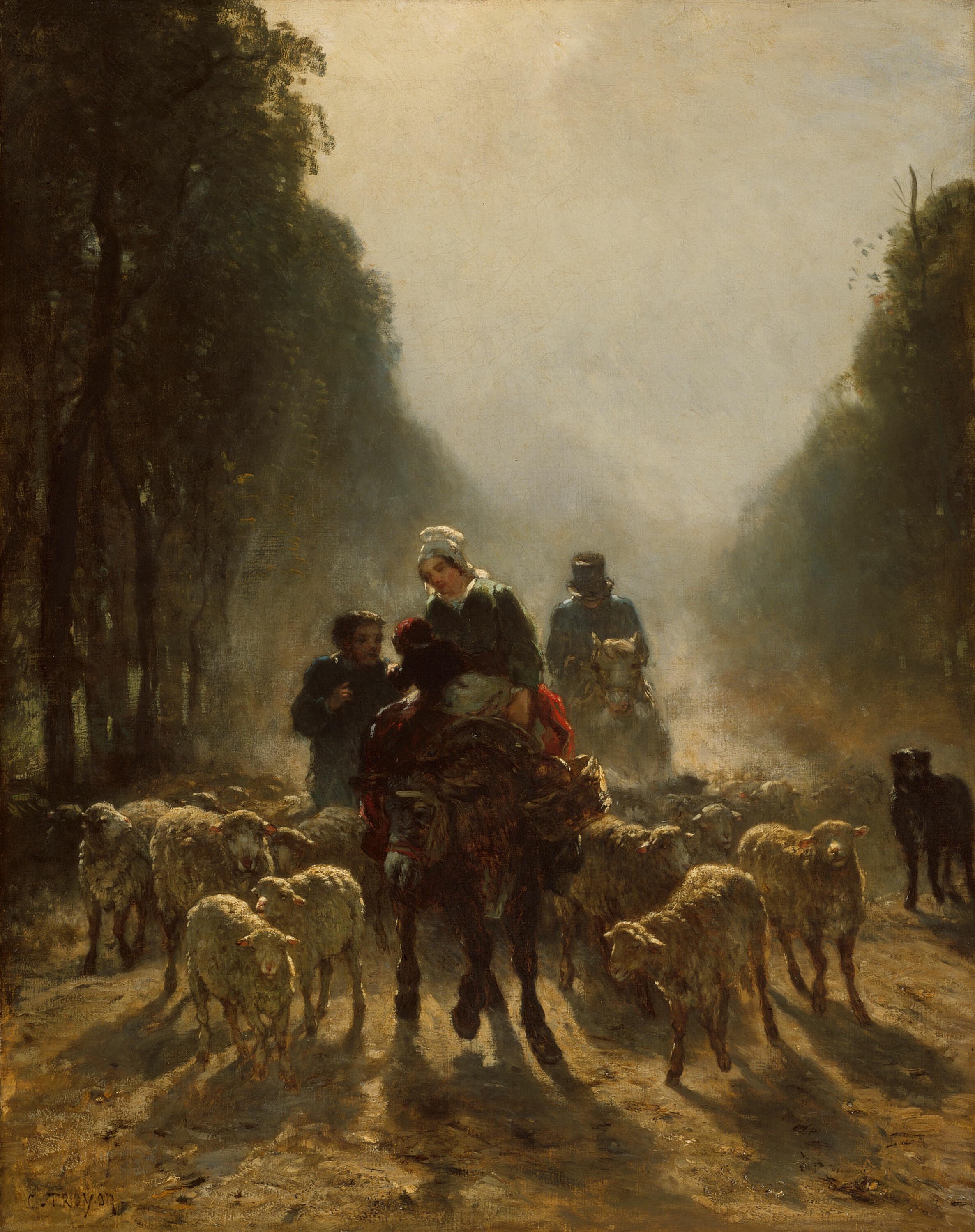
Constant Troyon: The Road to Market (1858/59)
" … worth gratefully beyond measure."
It pays nobody to misunderstand how Publishing works. It does not work like most markets or, depending upon one's ability to swallow experience, it works precisely like all markets, which is to say it works mindlessly. Those who believe they can predict how a particular work might sell, especially if from an unknown author, fool themselves first. Those who believe their book might make them rich and/or famous would be better served investing in lottery tickets, where the odds are somewhat better than those offered by Publishing's invisible thumb. Invisible hands put in their place, one need not necessarily remain naive to engage. Donald Trump, Jr., barely literate by most accounts, produced a best seller, but by the most tried and true method yet devised. The Republican National Committee purchased a hundred thousand dollars worth of the forgettable title "Triggered" the week it was released for use as "collateral," giving away a "free" copy with every donation. Trump's re-election campaign repeated that purchase with an even bigger buy. This market manipulation has become common among some wildly successful authors. You'd readily recognize their names.
Random House must be the most accurately named Publishing house ever, for the markets it serves primarily serve randomness to its players.


